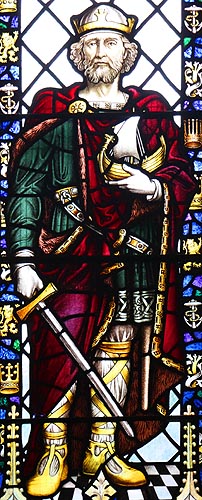 |
 |
|||
|
|
 Alfred,
King of Wessex & the English Alfred,
King of Wessex & the English(AD 849-899) Alfred was the youngest son of King Aethelwulf and his wife, Osberga. He was born at the Royal Palace of Wantage (Berkshire) in AD 849. He was brought up and educated by his mother and a famous story tells how she once promised an expensive illuminated book to the first of her children to learn to read it. Despite his young age, Alfred won the prize and he continued to understand the importance of knowledge throughout his later reign as King. When his brother, Aethelred, became King of Wessex in AD 865, Alfred was sixteen. He quickly became a seasoned warrior and his brother's right-hand man during one of the worst periods of invasion in English history. The Vikings had been raiding along the English coast for thirty years, but Aethelred's coronation year they conquered the Kingdom of East Anglia. Within five years, their Great Heathen Army had arrived in Wessex and seized the Royal palace at Reading (Berkshire). The local ealdorman managed to contain them until the King arrived, with Alfred and the English army. A siege at Reading was unsuccessful but, soon afterward in January AD 871, Alfred regrouped his brother's troops on the nearby Berkshire Downs and led them against the Viking hoards at the Battle of Ashdown. It was one of his greatest victories but, unfortunately, a number of defeats followed that same year, resulting in Aethelred's death. Alfred was now King of Wessex, but he was still unable to stop the Viking menace. After his defeat in the Battle of Wilton, at the end of AD 871, he decided he must sue for peace. A large payment persuaded the Vikings to retreat to York for the next four years; but, in the long-term, the money encouraged their return. King Alfred was soon forced to give away more of his treasury in AD 875 and again two years later. Once again, however, peace was short-lived. Alfred had spent the Christmas of AD 877 at his palace in Chippenham (Wiltshire). The Vikings kept track of his movements and early in the New Year, they launched a surprise attack. Alfred narrowly escaped capture but managed to flee into the marshes of Somerset. It was here that legend says he famously burnt the cakes of a local housewife while musing upon his predicament. From a temporary fort constructed at Athelney, Alfred rallied his remaining troops. For several months, they waged a guerrilla war against the Vikings until Alfred was able to call out the militia from Hampshire and Wiltshire. His new army crushed the invaders at Countisbury Hill (Devon) and then proceeded to their decisive victory at the Battle of Edington (Wiltshire). The Vikings were pushed back to Chippenham and besieged for three weeks before their leader, Guthrum, agreed to peace terms. The Treaty of Wedmore thus divided England in two, with the English ruling the south and the Vikings controlling the north, thence known as the 'Danelaw'. Guthrum was also obliged to be baptized into the Christian Church and retreat to East Anglia. A new period of peace then ensued and Alfred ensured that his people would always be safe from future attacks by setting up a systems of defensive forts or 'burghs' around the country. They were given permanent garrisons but were largely unoccupied. This allowed them to act as easily taxable trading centres or mints, as well as places of refuge when the need arose. Alfred completely reorganised his army so that half his forces were always in kept in reserve and he established a proper naval attachment with improved ships built with Frisian help. He also changed military tactics. Having invited the great Welsh scholar, Asser, to his court, Alfred had him negotiate the submission of Kings Hyfaidd of Dyfed, Elisedd of Brycheiniog and Hywel of Glywysing. Since these Welsh monarchs were already being harassed by the armies of King Anarawd of Gwynedd, they readily agreed; and an alliance with King Merfyn of Powys followed shortly afterward. In contrast, Alfred adopted an aggressive policy towards Viking settlers in Wessex and retook London in AD 886. This Alfred returned to his son-in-law, Aethelred II of Mercia and, along with the High-Reeve of Bamburgh, these two accepted his overlordship and protection. Alfred was delighted and issued new coinage to celebrate his becoming King of all the English. These alliances proved key to both English and Welsh defence when, between AD 892 and 896 armies containing of Wessex, Powysian and Mercian troops kept Viking invaders on the move and frustrated their goals. Even King Anarawd of Gwynedd eventually saw the advantages of Wessex overlordship. The moral and religious well-being of his people was as important to King Alfred as their physical protection. Influenced by Christian kingship ideals developed during the Carolingian Renaissance, he introduced law-codes based on traditional Old Testament legislation. The Royal Court became a magnet for eminent scholars who became the nucleus around which a great resurgence in Christian learning developed. As well as Asser, Alfred's biographer, Frankish & Germanic scholars such as St. Grimbald (later appointed Dean of the New Minster in Winchester) and John the Old Saxon (appointed Abbot of Athelney) were a great influence on the King. Despite a rebuke from Pope John VII for annexing former church lands, Alfred was a very pious man and founded a number of monasteries: Shaftesbury for his daughter, Princess Aethelgitha, and Athelney in celebration of his regaining the kingdom. He was an especially remarkable man who actually undertook a number of translations himself from Latin to old English: the Regula Pastoralis of Gregory the Great, the De Comolatione Philosophiae by Boethius, St. Augustine's Soliloquia and the first fifty Psalms. He, of course, commissioned other scholars to follow his example and was probably instigated the compilation of the Anglo-Saxon Chronicle. The King was keen for others to benefit from having such works available to them; and this is made clear in the preface to his Regula Pastralis translation which he sent to every diocese in the Kingdom along with accompanying golden manuscript pointers. Here, he calls for his bishops to take the book's principles seriously and to ensure their priests do the same. Royal officials, like Ealdormen, were all expected to study or risk dismissal. Christian teachings encouraged the idea that kings were God's representatives on earth, and Alfred always managed to use this to his advantage. Alfred's will shows he could be ruthless when the need arose, ensuring that his son, Edward, took the throne upon his death, rather than one of his elder cousins. He was a powerful king who commanded respect from all ethnic groups across the country; and his legacy provided a springboard for his successors to reach even greater heights. About AD 868, he had married Elswith, daughter of Aethelred Mucil, Ealdorman of the Mercian tribe called the Gaini, by his wife, Edburga, thought to have been the sister of St. Wistan. They had at least four other children besides Edward: Aethelflaed, Aethelgitha, Aelfthrith and Aethelweard. King Alfred died on 26th October AD 899. His son built the New Minster in Winchester as a family mausoleum to house his tomb. Click for More Images of King Alfred
|
|||
| © Nash Ford Publishing 2003. All Rights Reserved. | ||||


